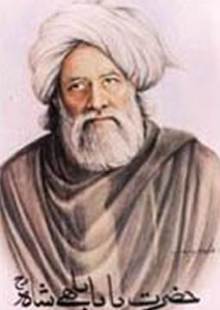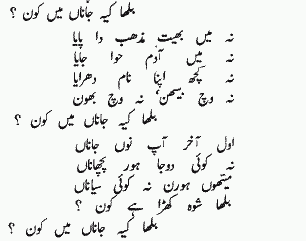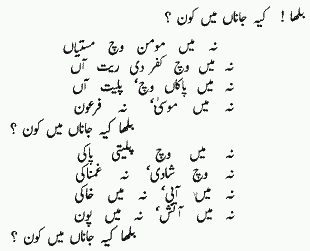Adil Najam
 A whole new generation has rediscovered Bulleh Shah. That is good.
A whole new generation has rediscovered Bulleh Shah. That is good.
Much of the credit for this rediscovery goes to the ‘sufi rock’ band Junoon and, more recently to the New Delhi singer Rabbi Shergill, and most importantly to the magnetic simplicity of ‘Bulla, ki jaanan mein koun.’ (I guess, Abida Parveen did for our generation what these guys are doing in interpreting Bulleh Shah for a new generation).
I must confess that I am a traditionalist and prefer more classical renditions of this timeless piece. My own sense, much like Deevan’s (of the blog ‘Rambling On’), is that Rabbi Shergill does a far superior job than Ali Azmat did. At least for me, Rabbi seems to ‘gets it’ more than Junoon did. But, in honesty, I am grateful to both; I also think that both should be grateful to Bulleh Shah.
So, why not judge for yourself. Here is the rendition by Rabbi Shergill. If you are new to Bulleh Shah, listen to it a couple of times before giving up on it. You can view it here by clicking on the play (arrow) button on the image below, or go to video.google.
For those who may want it, here is a version of the original and a translation by Kartar Singh Duggal:


I know not who I am
I am neither a believer going to the mosque
Nor given to non-believing ways
Neither clean, nor unclean
Neither Moses not Pharoah
I know not who I am
I am neither among sinners nor among saints
Neither happy, nor unhappy
I belong neither to water not to earth
I am neither fire, not air
I know not who I am
Neither do I know the secret of religion
Nor am I born of Adam and Eve
I have given myself no name
I belong neither to those who squat and pray
Nor to those who have gone astray
I know not who I am
I was in the beginning, I’d be there in the end
I know not any one other than the One
Who could be wiser than Bulleh Shah
Whose Master is ever there to tend?
I know not who I am.
‘Ki jaanan mein koun’ is the best known and most elegant of Bulleh Shah’s work and is itself an adaptation/translation from the works of earlier Persian philosophers. I wish that more people and singers will start looking at the rest of Bulleh Shah’s repertoire. Some have. For example, Shoaib Mansoor has already done a wonderful rendition of ‘Teray ishq nachaya kar thai-ya thai-ya’ as part of the Supreme Ishq series. And Noori has a song that seems inspired by ‘Kuttey tain-to uttay’.
If others also paid Bulleh Shah more attention, they might find that in terms of his themes Bulleh Shah may be the most contemporary poet in South Asia today. Try looking at ‘Bass kar ji’ (Enough is enough) or ‘Moun aayee baat na rehndi hai’ (I must utter what comes to my lips) and you will find them resonating with your most contemporary political and social preoccupations.
Followup post on Bulleh, Jugni, Shergill & Junoon, here.




















































If we take this plagiarization bit is true, then most of Shakespeare’s work could be termed plagiarization as well since most of his stories have been taken from other lesser writers. Its the way he treated them that made him what he is.
And mr. Najam, in your blogs of note, i am really surprised not to find ‘The Olive Ream’s blog.
Thanks for a really nice post. A few things.
1. I too was amazed at the picture of Bulleh Shah. Is that real. I must admit, I also expected a less-establishment-looking-dude.
2. It seems that those of you who come to this from the direction of the poetry and of Bulleh Shah like Rabbi’s version. Those coming from the side of music like Junoon’s. No?
3. Anyone notice the relevance of the words to the state of Pakistan’s politics. Do we really know WHO WE ARE, as a people, as a nation? Is that why this is so enticing. Was that your hidden purpose, Professor sahib?
Thanks all, for these wonderful comments, am still digesting this rich fare (especialy about the ‘lost’ Punjabi from Naveed…. by the way, as testimony to the power of teh blog, Naveed and I knoew each other on message boards years and years ago when we were students, then we lost touch entirely and this blog has brought us in contact again…. now is that not wonderful….
Anyhow, the one think I want to comment on is the issue that an Anonymous poster on Naveed’s blog (Rambling On) comments on; suggesting that Bulleh Shah plagiarized this from earlier Persian Sufi poetry. My understanding has alwasy been that MUCH of Sufi poetry in teh sub-continent, Punjabi, Seraiki and other was influenced by Rumi and others and much of it was consciously trying to translate/transmorgify it into local subcontinental languages. I do not think the intent or the effect was plagiarism, it was translation — but more than that it was transformation into more local sensibilities and the addition of new subtleties… I wish we did more of that today….
adil, another translation posted on my blog site if anyone is interested…i now remember what got me to appreciate rabbi….he starts the kafi remaining true to it and calling out BULLA and rabbi is Bulleh Shah…whereas Ali Azmat calls out bullay-aa so Ali Azmat is addressing Bullay Shah
In my books that changes the context but that could just be me
No match to Aabida Parveen,but certainly Rabbi is more appealing than Janoon.